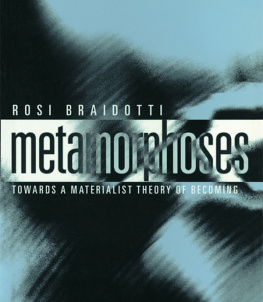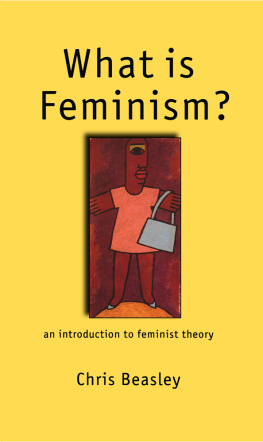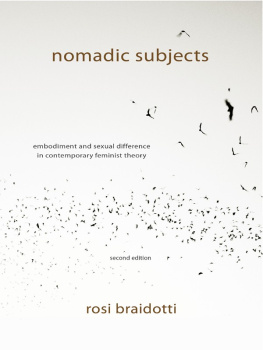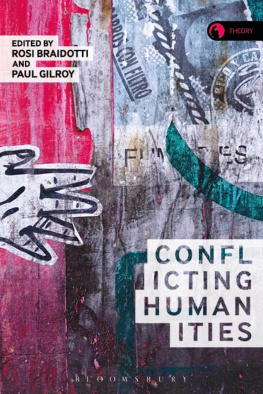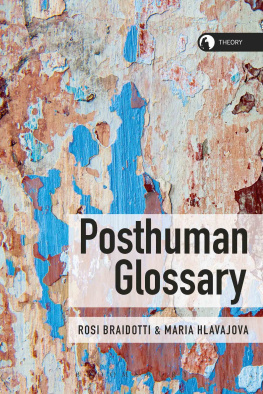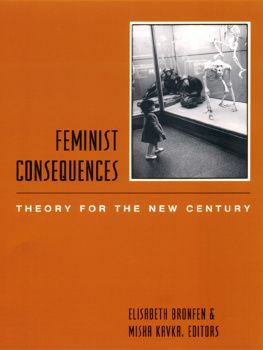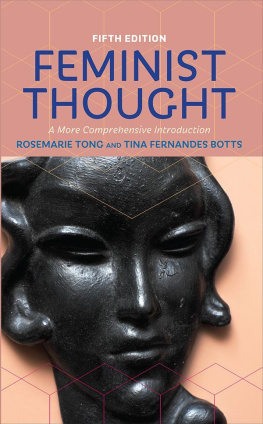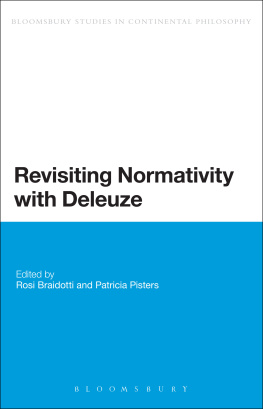NOMADIC THEORY
GE NDER AND CULTU RE
ROSI BRAIDOTTI
NOMADIC THEORY
THE PORTABLE ROSI BRAIDOTTI
COLUMBIA UNIVERSITY PRESS
NEW YORK

COLUMBIA UNIVERSITY PRESS
Publishers Since 1893
New York Chichester, West Sussex
cup.columbia.edu
Copyright 2011 Columbia University Press
All rights reserved
E-ISBN: 978-0-231-52542-8
Library of Congress Cataloging-in-Publication Data
Braidotti, Rosi.
Nomadic theory: the portable Rosi Braidotti / Rosi Braidotti.
p. cm.(Gender and culture)
Includes bibliographical references (p.) and index.
ISBN 978-0-231-15190-0 (cloth: alk. paper)ISBN 978-0-231-15191-7 (pbk.:
alk. paper)ISBN 978-0-231-52542-8 (e-book)
1. Philosophy, Modern21st century. 2. Continental philosophy.
3. Critical theory. I. Title.
B805.B69 2011
195dc23
2011040404
A Columbia University Press E-book.
CUP would be pleased to her about your reading experience with this e-book at cup.ebook@columbia.edu.
References to Internet Web sites (URLs) were accurate at the time of writing. Neither the author nor Columbia University Press is responsible for Web sites that may have expired or changed since the book was prepared.
CONTENTS
My heartfelt gratitude goes primarily to Jennifer Crewe, my publisher, who instigated this project and saw it through. Nancy Miller was enthusiastic and supportive as ever; Elizabeth Weeds insightful comments were most welcome. Thanks also to Claire Colebrook for her inspiration and lucid criticism and to Clare Hemmings, Patrick Hanafin, and Lisa Baraiter for their careful reading of my texts. I am very grateful to the dean of my faculty, Wiljan van der Akker, for doing everything in his power to create work conditions conducive to completing this book. I wish to thank many generations of research assistants whose help with bibliographical details and editing was precious: Stephanie Paalvast did an amazing job in the final round, but before her Marleen and Pauline Vincenten, Sandra Solomon, Valeska Hovener, Kristl van Eijk, and Eva Midden provided vital assistance. I also profited enormously from the comments and support of former students and younger colleagues: Bolette Blaagaard and Iris van der Tuin, Maayke Botman, Rutvica Andrijasevic, Cecilia Alsberg, Sarah Bracke, Esther Captain, and Griet Roets were especially supportive. There are too many graduate students I should thank for the inspiration and the vitality, so I acknowledge them all collectively. A special word of thanks and praise for Esther Rinkens, the executive manager of the Centre for the Humanities, whose efficiency management, loyalty, and harmonious disposition created time for my writing and also to Lianne Toussaint. All my gratitude to Natasha Unkart, my favorite photographer, who designed the stunning cover. To my brother Gus, my sister Gio, and to my parents Mario and Bruna for their unfailing enthusiasm.
Special thanks to Anneke Smelik, for an amazing life together.

Animals, Anomalies, and Unorganic Others in Publications of the Modern Language Association of America (PMLA) (Modern Language Association, 2009).
Affirmative Ethics and Bio-Politics in New Formations (Lawrence and Wishart, 2007).
Biomacht und Nekro-Politik. berleberungen zu einer Ethik der Nachhaltigkeit in Springerin, Hefte fur Gegenwartskunst (Verein Springerin, 2007).
Affirmation, Pain, and Empowerment in Asian Journal of Womens Studies (Ewha Womans University Press, 2008).
Affirmation Versus Vulnerability: On Contemporary Ethical Debates in Symposium: Canadian Journal of Continental Philosophy (Canadian Society for Continental Philosophy, 2006).
Becoming Woman/Animal/Imperceptible in Rosi Braidotti, Transpositions (Cambridge: Polity, 2006).
Meta(l)morphoses in Theory, Culture , and Society (Sage, 1997).
Meta(l)flesh in Zoe Detsi-Diamanti, Katerina Kitsi-Mitakou, and Effie Yiannopoulou, eds., The Future of Flesh: Bodily Mutation and Change (London: Palgrave Macmillan, 2009).
Towards the Posthuman in Rosi Braidotti, la philosophie... l o on ne lattend pas (Paris: Larousse, 2009).
Feminist Philosophy in John Mullarkey and Beth Lord, eds., The Continuum Companion to Continental Philosophy (London: Continuum, 2009).
A Critical Cartography of Feminist Post-postmodernism in Australian Feminist Studies (Taylor and Francis, 2005).
Intensive Genre and the Demise of Gender in Angelaki. Journal of the Theoretical Humanities (Taylor and Francis, 2008).
In Spite of the Times: The Postsecular Turn in Feminism in Theory, Culture, and Society (Sage, 2008).
On Becoming Europeans in Luisa Passerini, Dawn Lyon, Enrica Capussoti, and Loanna Laliotou, eds., Women Migrants from East to West. Gender, Mobility and Belonging in Contemporary Europe (Oxford: Berghahn, 2007).
Nomadism: Against Methodological Nationalism in Diaspora (Toronto: University of Toronto Press, 2010).
Elemental Complexity and Relational Vitality: The Relevance of Nomadic Thought for Contemporary Science in Peter Gaffney, ed., The Force of the Virtual : Deleuze, Science , and Philosophy (Minneapolis: University of Minnesota Press, 2010).
A Secular Prayer in Bart de Baere, ed., All That Is Solid Melts Into Air: Five Reflections on Materialist Spirituality in Contemporary Art (Antwerp: Uitgeverij Lannoo, 2009).
Selected chapters from Metamorphoses: Towards a Materialist Theory of Becoming (Cambridge: Polity, 2002).
NOMADIC THEORY
Its not enough simply to say concepts possess movement; you also have to construct intellectually mobile concepts.
GILLES DELEUZE, NEGOTIATIONS
This volume of selected essays presents an ongoing project in nomadic theory, with the aim of analyzing, illustrating, and assessing the relevance of nomadic thought today. It constitutes the companion to Nomadic Subjects, which has just been published in a revised and expanded second edition (Braidotti 2011). The two books are sequential and interlinked, though each is autonomous and stands on its own: Nomadic Theory is in some ways the application of the fundamental principles outlined in the previous volume. Being single and multiple, independent and interconnected, Nomadic Subjects and Nomadic Theory form a complex singularity or a nondualistic assemblage. They frame and actualize a nomadology that instills movement and mobility at the heart of thinking. My aim in this book is to explore from a variety of locations the method, structure, and the practical applications of nomadic theory. This volume argues that thinking today is structurally nomadic. There are at least three ways to illustrate this principle: conceptually, politically, and contextually. Let me address each one of these in order, by way of an introduction.
CONCEPT
Conceptually, nomadic thought stresses the idea of embodiment and the embodied and embedded material structure of what we commonly call thinking. It is a materialism of the flesh that unifies mind and body in a new approach that blurs all boundaries. The embodiment of the mind and the embrainment of the body (Marks 1998) are a more apt formulation for nomadic thought than Cartesian or other forms of dualism. Nomadic thought builds on the insights of psychoanalysis by stressing the dynamic and self-organizing structure of thought processes. The space of nomadic thinking is framed by perceptions, concepts, and imaginings that cannot be reduced to human, rational consciousness. In a vitalist materialist way, nomadic thought invests all that lives, even inorganic matter, with the power of consciousness in the sense of self-affection. Not only does consciousness not coincide with mere rationality, but it is not even the prerogrative of humans. This emphasis on affect and extended consciousness, however, is not the same as the Freudian unconscious.


